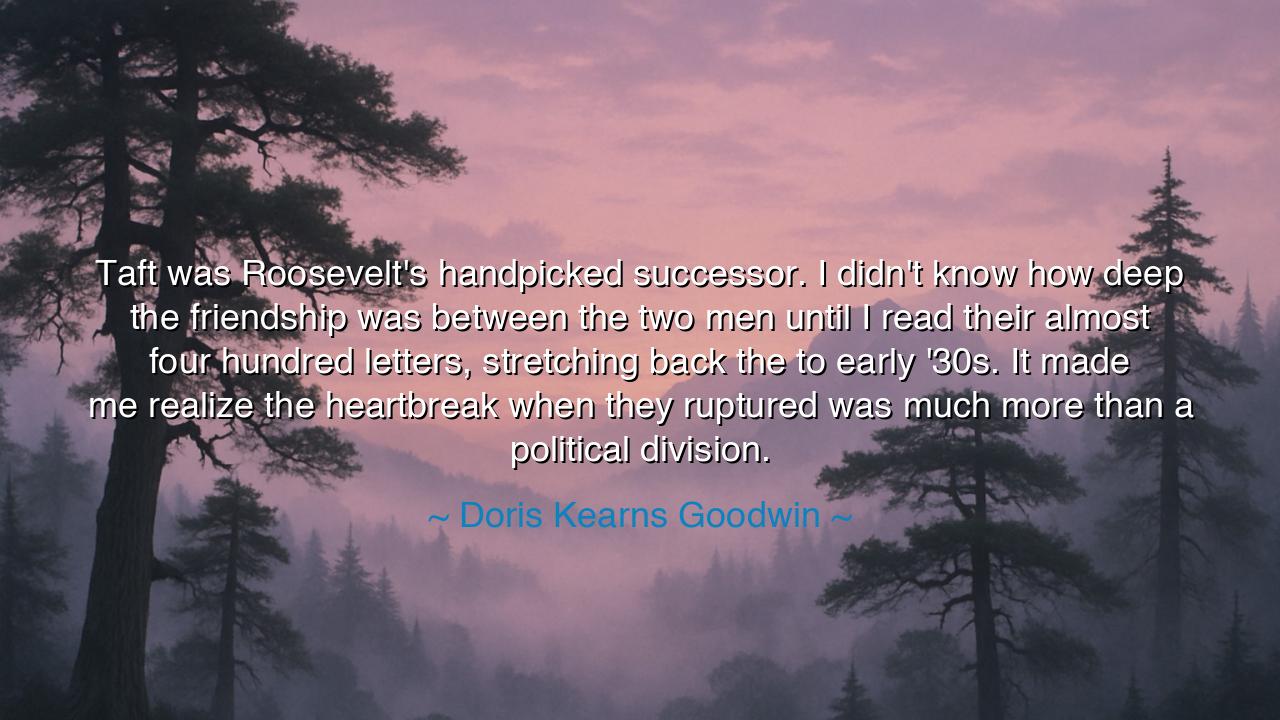
Taft was Roosevelt's handpicked successor. I didn't know how deep
Taft was Roosevelt's handpicked successor. I didn't know how deep the friendship was between the two men until I read their almost four hundred letters, stretching back the to early '30s. It made me realize the heartbreak when they ruptured was much more than a political division.






In her reflection, Doris Kearns Goodwin, one of the great historians of the modern age, uncovers a deeply human truth hidden within the corridors of power. She writes: “Taft was Roosevelt’s handpicked successor. I didn’t know how deep the friendship was between the two men until I read their almost four hundred letters, stretching back to the early '30s. It made me realize the heartbreak when they ruptured was much more than a political division.” These are not merely the words of a scholar — they are the lament of one who has looked into the letters of giants and found within them the trembling pulse of friendship, loyalty, and loss. Beneath the surface of history’s grand battles lies the quiet tragedy of the human heart.
The origin of this quote lies in Goodwin’s meticulous study of the correspondence between Theodore Roosevelt and William Howard Taft, two men bound by affection and torn apart by ambition. When Roosevelt left the presidency in 1909, he trusted Taft — his old friend, his confidant, his comrade-in-arms — to carry forth his vision of reform. But as Taft’s presidency unfolded, their paths diverged. What began as a relationship of mutual respect turned into one of painful rivalry. When Roosevelt challenged Taft for the presidency in 1912, their conflict split not only the Republican Party but the bond between two men who had once trusted each other more than anyone else in the world.
Goodwin’s discovery — those four hundred letters — revealed that this was no mere political quarrel. It was a personal heartbreak, the kind that transcends ideology. Their words were filled not just with policy and philosophy, but with affection, admiration, and humor. To read them, Goodwin realized, was to witness the slow erosion of brotherhood under the grinding wheels of pride and circumstance. Theirs was the classic story of friendship undone by power — as old as Caesar and Brutus, as timeless as the human heart’s frailty.
It is easy to imagine Roosevelt, fiery and restless, feeling betrayed by what he saw as Taft’s caution and compromise; and Taft, gentle and steadfast, feeling wounded by Roosevelt’s impatience and public attack. Both men loved the same dream — the progress of their nation — yet could not walk the same road toward it. In that tragic divergence lies the essence of human conflict: when two hearts bound by love and purpose part ways not out of malice, but conviction. Theirs was not a political division, as Goodwin so rightly says, but a spiritual fracture — the shattering of trust between friends who once believed their bond unbreakable.
A parallel can be found in another age, in the story of Thomas Jefferson and John Adams, comrades in revolution who became bitter enemies in peace. They too exchanged hundreds of letters, each one a testament to affection tested by politics, and pride pierced by longing. Yet in the twilight of their lives, they reconciled — writing once more as old warriors who had seen too much to hate. Their final letters, tender and reflective, are monuments to forgiveness. Theirs, like Roosevelt and Taft’s, remind us that even the greatest minds are not immune to the wounds of friendship.
Goodwin’s insight speaks beyond history — it speaks to the heart of every human relationship. She teaches us that great friendships are forged in trust, but sustained by humility. When pride enters, even the strongest bond can fray; when empathy departs, even years of loyalty can be undone. The heartbreak between Roosevelt and Taft stands as a warning: that no matter how noble the cause, the loss of love between friends leaves a scar deeper than any political defeat. For the nations they led have long since healed, but their broken bond still echoes through time as a lament for what could have been.
The lesson is clear: guard your friendships more fiercely than your victories. Let no ambition, no argument, no hunger for recognition cost you the treasure of loyalty freely given. In practical action, this means to speak truth with kindness, to forgive quickly, to remember the person behind the difference. If a rift must come, let it come with gentleness, not wrath; and if reconciliation is possible, seek it before pride hardens the heart. For as Goodwin’s discovery reminds us, the greatest heartbreaks are not written in the wars of nations, but in the silences between friends who once spoke with love.






AAdministratorAdministrator
Welcome, honored guests. Please leave a comment, we will respond soon